Pres. Park wraps up her cabinet lineup by retaining incumbent Defense Minister Kim
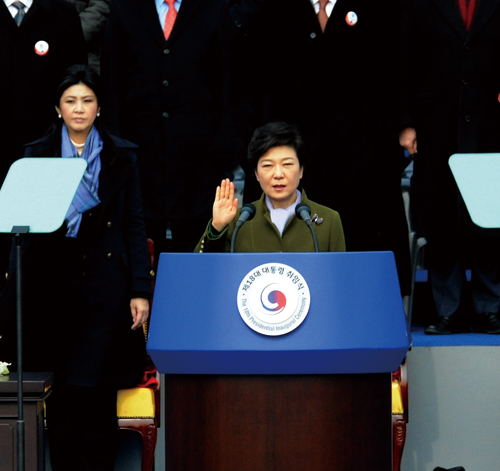
The Park Geun-hye government is finally
on the right track 26 days after she took office on Feb. 25, ending the
political impasse and administration vacuum.
President Park Geun-hye obtained
approval of her government reorganization bills from the National Assembly on
March 22, but in watered down versions. The parliament passed the bills calling
for the restructuring of government to 17 ministries and three lower-level ones
from the format of 15 ministries and two low-level ones.
The ending of the political impasse came
51 days after the measures were submitted to the parliament on Jan. 30. The
ruling Saenuri Party and the main opposition Democratic United Party had been
at loggerheads over which government entity is charged with broadcasting
affairs. The opposition side took issue with the handing over of the authority
regarding the licensing of concerned businesses to the new Ministry of Future
Planning and Science. The two sides narrowly agreed on the wording of the
previous agreement, which emerged as the last stumbling block. The final deal
calls for the Korea Communications Commission to be in charge of relicensing
and licensing of terrestrial broadcasting and instead be required to reflect
the results of technical reviews done by the newly created ministry. The
ministry will also be required to obtain approval from the KCC in deciding any
changes in the operation of cable system operators, satellite television
companies, and other related businesses.
President Park on the same day chose to
retain incumbent Defense Minister Kim Kwan-jin, replacing controversy-ridden
minister-designate Kim Byung-gwan, who bowed out because of opposition from
many lawmakers, even those from the ruling Saenuri Party over allegations of
controversial relations with a resource developer and other issues.
President Park’s decision to appoint Kim
to become the first defense minister of the new government is interpreted as
her inevitable bid to eliminate the administration vacuum as early as possible,
especially with North Korea’s saber rattling and its provocative offensive
rhetoric. North Korea has heightened tensions against South Korea to retaliate
against the United Nations’ latest sanctions against the Stalinist regime’s
latest nuclear test in February.
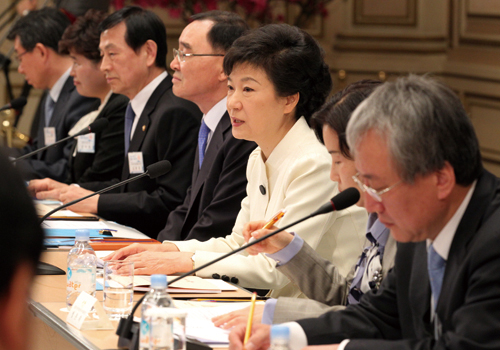
receives a policy briefing from the Ministry of Health Welfare on March 21.
Presidential spokesman Kim Haing said
that the nation is in a national security crisis following North Korea’s
provocations, such as the recent cyber terrorist attack. President Park made
the decision (on the appointment of Defense Minister Kim) that the situation
was too serious for the security of the country and people to further delay and
undergo another round of political bickering and consumptive partisan brawls
during a confirmation hearing.
Minister Kim has become the first
defense minister to be retained by a succeeding president in Korean history.
The minister now teams up with Kim Jang-soo, chief of the presidential office
of national security, and National Intelligence Service (NIS) chief Nam
Jae-joon. They are all graduates of the Korea Military Academy.
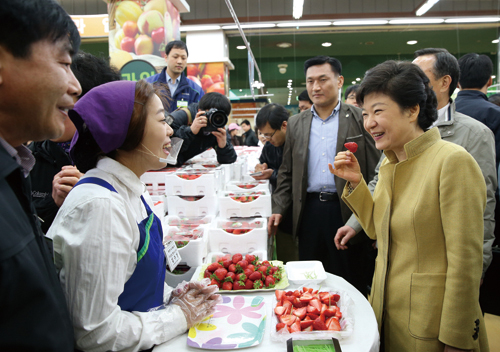
visits a supermarket in Seoul to check the prices of agricultural products on March 13
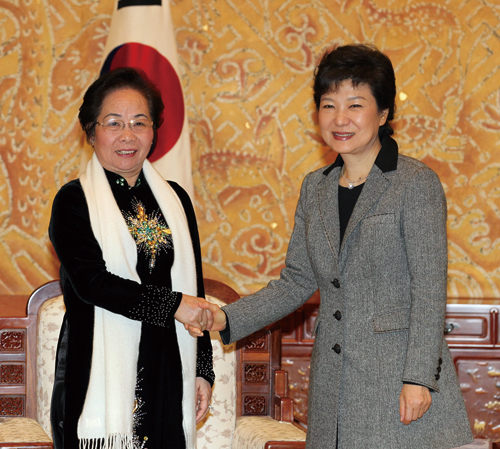
shakes hands with Vice President of Vietnam Nguyen Thi Doan
Defense Minister Kim has been at the
helm at the Defense Ministry since December 2010, shortly after Yeonpyeong
Island near the maritime border in the West Sea was bombed by North Korean
artillery. Kim has been credited with holding a clear vision for security and
leadership. A native of Jeonju, Jeollabuk-do, Kim, in a meeting with reporters
after his appointment, reconfirmed his attitude to get tough against North
Korea’s provocations. “I’ll do my best to handle the current security
situation, and I will firmly maintain military readiness to be able to
retaliate if provoked.”
Later in the day, President Park gave an
appointment certificate each to Deputy Prime Minister for Economy Hyun Oh-seok,
NIS chief Nam and Financial Services Commission Chairman Shin Jae-yoon.
In her meeting following the appointment
ceremony, President Park told Deputy Prime Mister Hyun, “To restore our
economy, the new government promised to turn to a creative economy to bring
about an economic resurgence.” She went on to say that as for economic
democratization, it can be defined as “building a fair and transparent market
environment in which anyone can be given a reward for what he or she has done
ardently.”
Park noted that the creative economy
could bloom under that environment, so the two tasks have to be carried out
side by side, and it is more important than ever for the deputy prime minister
to play a part as a control tower because convergence should take place
unyieldingly under the creative economy.
President Park told Defense Minister Kim
the government should do its utmost to maintain readiness from the perspectives
of security and public safety lest people feel worry and uneasiness with North
Korea’s ratcheting up of its provocation offensive.
Park presided over the first cabinet
meeting of the new government on March 11 after presenting appointment
certificates to 13 ministers, who underwent grueling confirmation hearings at
the National Assembly. The ministers included Suh Nam-soo, minister of the
Ministry of Education, Science and Technology and Yoon Byung-se, minister of
the Ministry of Foreign Affairs and Trade. Most of the ministers carried the
current names of the ministries, not the new ones, because the government
reorganization bills were pending in the parliament.
A series of ministers-designate bowing
out from opposition by lawmakers during confirmation hearings has dented the
credibility of President Park’s personnel management system and exposed a lot
of loopholes surrounding the appointment and confirmation processes. The
dropout defense minister-designate Kim joined five other former nominees
including Prime Minister-nominee Kim Yong-joon; Future Planning and Science
Minister-nominee Kim Jong-hoon, who gave up his nomination citing his
disappointment over the Korean political environment; and Small and Medium
Business Administration Chief-nominee Hwang Chul-joo, who resigned citing the
requirement for public officials to sell off assets related to their duties.
PRESIDENT PLEDGES NEW ERA OF HOPE,
HAPPINESS
President Park took office as the
president of the Republic of Korea in an official ceremony with her
administration focusing on pursuing social integration and opening a new era of
hope. Park pledged her determination to achieve an economic resurgence, the
flourishing of culture, and the happiness of people.
Under the catchphrase “Opening a New Era
of Hope,” the presidential inauguration ceremony took place in front of the
National Assembly in Seoul on Feb. 25.
Regarding an economic resurgence, she
said the new government will usher in a new era of hope premised on a
revitalized economy through pursuing a creative economy and economic democratization.
“In order to have a creative economy
truly blossom, economic democratization should be attained,” said Park,
stressing the significance of economic democratization as a prerequisite of a
creative economy. “I believe strongly that only when a fair market is firmly in
place, can everyone dream of a better future and work to their fullest
potential,” she said.
On the issue of welfare, Park stressed
the importance of education and cited a new paradigm of tailored welfare. “A
new paradigm of tailored welfare will free citizens from anxieties and allow
them to prosper in their own professions, maximize their potentials, and also
contribute to the nation’s development.
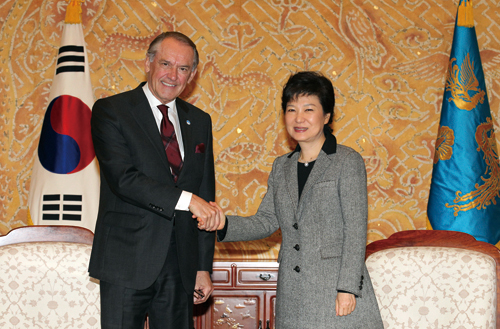
shakes hands with U.S. National Security Adviser Thomas Donilon on Feb. 26.
PRESIDENTIAL NOMINATIONS
On Feb. 24, President Park appointed
transition team spokesman Yoon Chang-jung and and Kim Haing, vice chairmen of
the social network news service Wikitree, as presidential spokespeople.
Also assigned to the presidential chief
secretary’s office were Deputy Minister of Strategy and Finance Chu Hyung-hwan
in charge of economy and finance; Deputy Minister Moon Jae-do of the Ministry
of Knowledge Economy in charge of Trade, Industry and Energy; Deputy Minister
Kim Kyung-shik of the Ministry of Land, Infrastructure and Transport in charge of land and transportation; Director
General Choi Soo-kyu of the Small and Medium Business Administration in charge
of SMEs.
Director General Hong Nam-ki of the
Policy Coordination Bureau at the Ministry of Strategy and Finance was tapped
as presidential secretary in charge of state planning.
President Park named Paik Ki-seung,
publicity councilor at the Saenuri Party’s campaign team, as presidential
secretary of state public relations at the senior presidential chief public
relations secretary’s office; Director General Kim Hyung-jin of the Foreign
Affairs and Trade (MOFAT) was named presidential secretary for diplomatic
affairs; and Deputy Minister Kim Hong-kyun of the Peace and Diplomacy Corps at
the MOFAT was tapped as presidential secretary for international cooperation. A
graduate of Yonsei University Politics and Diplomacy Department, Paik was one
of the close confidants of ex-Chairman Kim Woo-joong of the now-defunct Daewoo
Business Group.
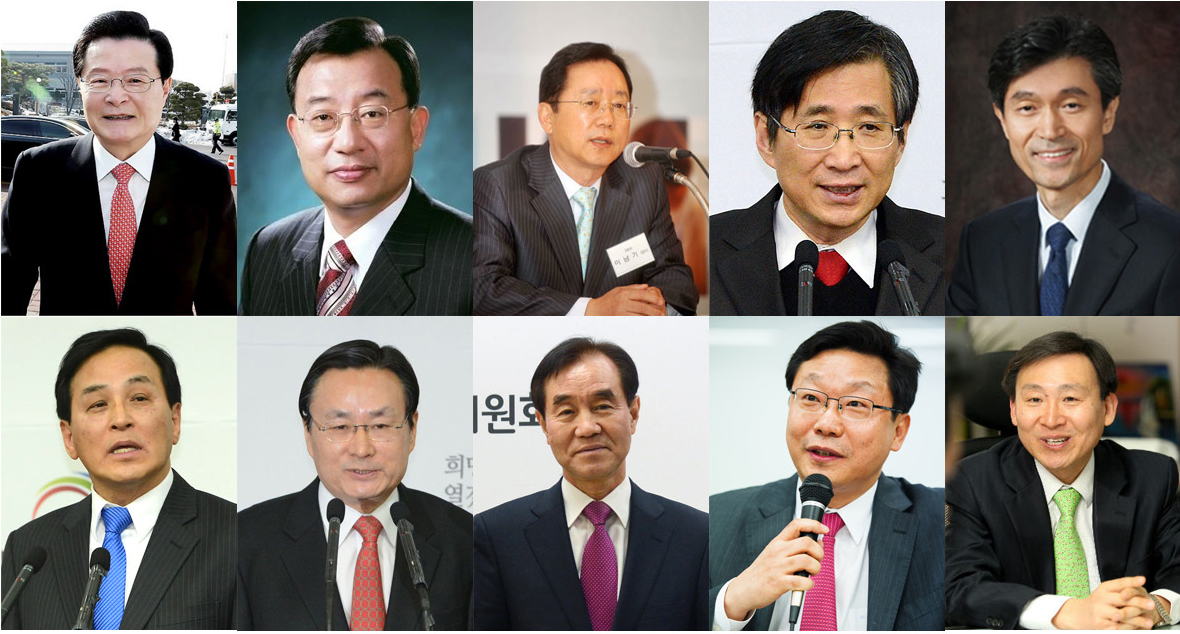
(from right, top row) Huh Tae-yeol, presidential chief of staff,; Lee Jung-hyun, senior presidential secretary for political affairs,; Lee Nam-ki, senior presidential secretary for public relations,; Cho Won-dong, senior presidential secretary for economic affairs,; and Mo Chul-min, senior presidential secretary for education and cultural affairs.
(from right, below row) Choi Sun-hong, senior presidential secretary for future strategy,; Ju Chul-ki, senior presidential secretary for foreign affairs,; Choi Sung-jae, senior presidential secretary for labor and secretary,; Chu Hyung-hwan, presidential secretary for economy and finance,; and Moon Jae-do, presidential secretary for Trade, Industry and Energy.
